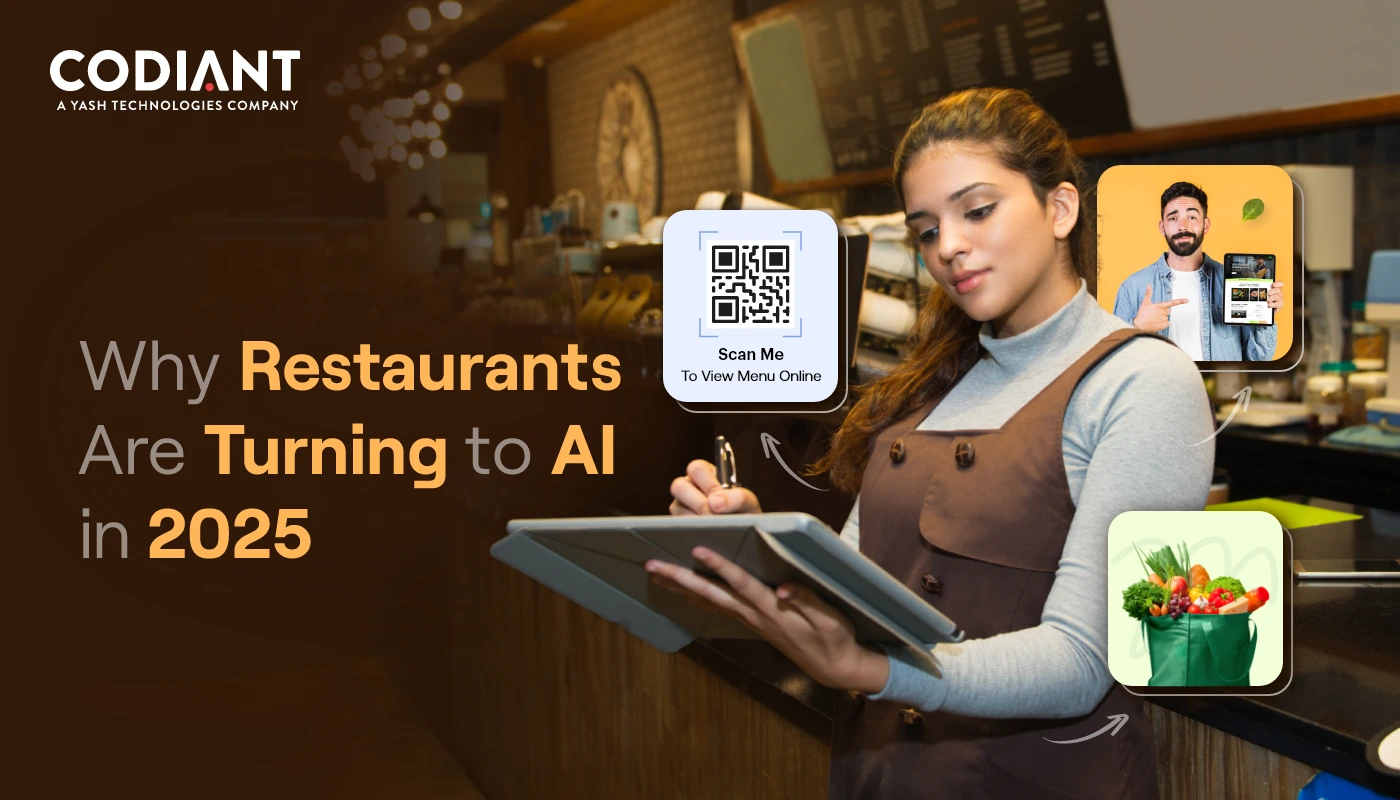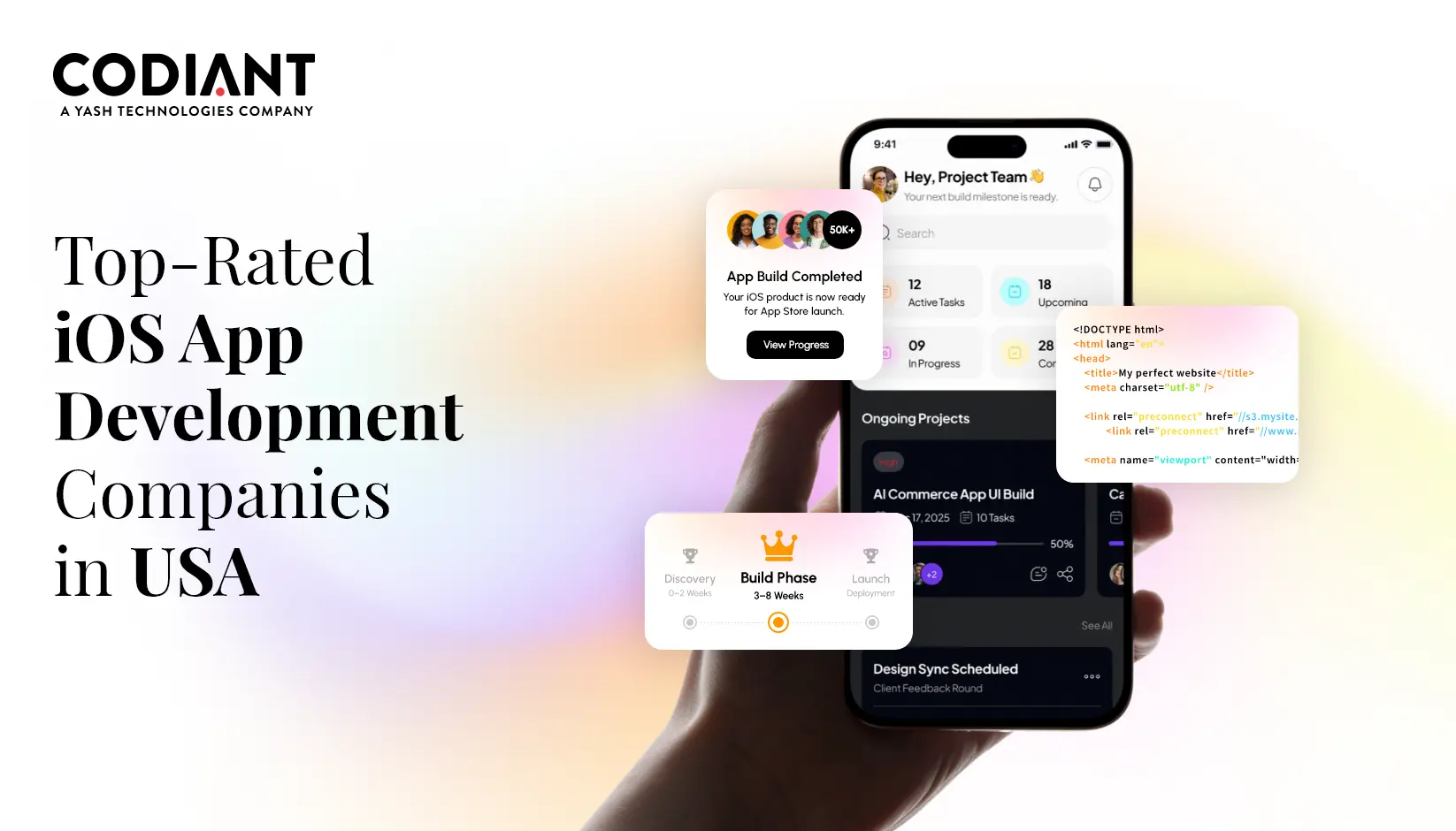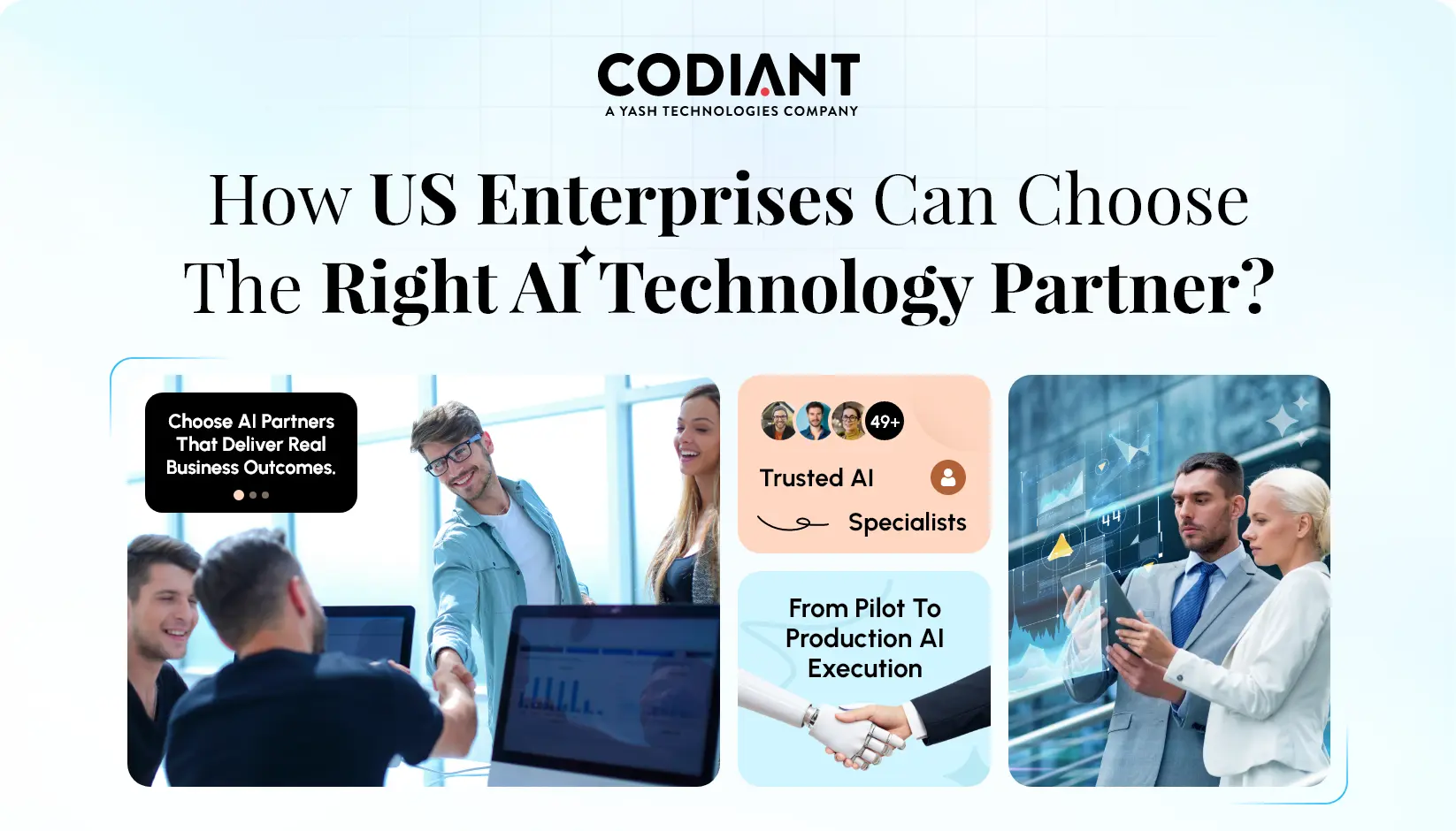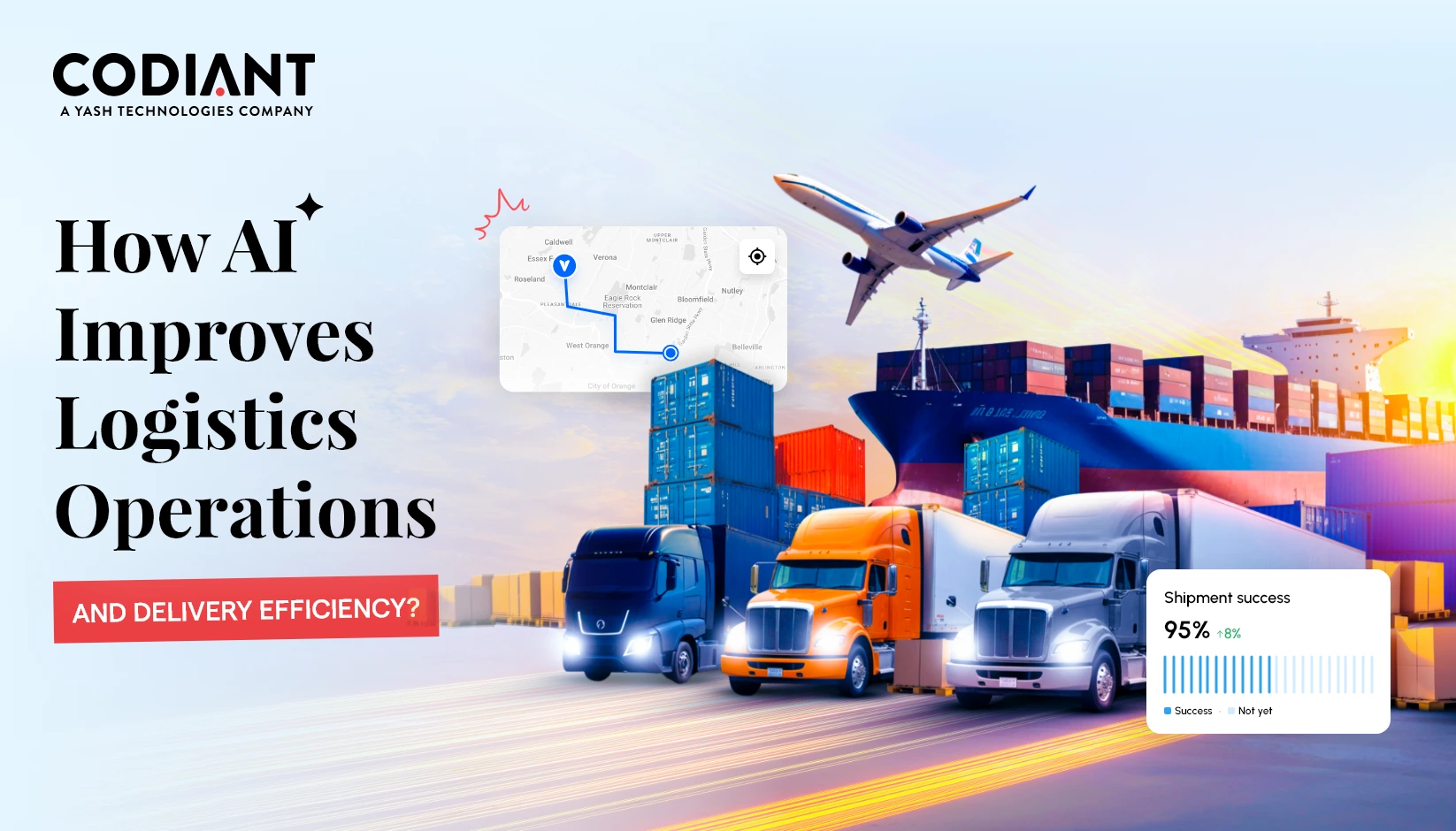How AI Is Used in the Restaurant Industry?
Table of Contents
Subscribe To Our Newsletter

Ten years ago, the restaurant business was about ambience, flavour and service. Today those pillars are still standing and they’re about to get a major booster shot from AI.
Technology has quietly knitted itself into the daily operations of food businesses and AI in the restaurant industry is the leading it. From cutting food waste to predicting customer desires, AI isn’t a future, it is fast, functional, and profitable now.
But what does that reality mean for restaurant owners, operators and investors in the USA, the UK or other places? In this post, I will explain how AI in hospitality is reshaping everything from your kitchen to your customer experience. And these aren’t just hypotheticals. These are real solutions being embraced in the food sector, by some of the world’s largest companies — and increasingly, by smaller and midsize companies as well.
Let’s introduce some of the smartest ways you can use AI in food industry operations and stay ahead of the curve.
Role of AI in Restaurants & Hospitality Industry
In the hospitality industry, Artificial Intelligence solutions refer to systems and software that decrease human decision-making by processing data, learning from it, and acting on it. This includes technologies like:
- Machine learning (for analyzing data and improving outcomes)
- Computer vision (for inventory, food recognition, or security)
- Natural language processing (NLP) (for chatbots and feedback analysis)
- Automation (for repetitive kitchen or service tasks)
Restaurants use AI to:
- Understand guest behavior
- Forecast staffing or demand
- Automate customer service
- Personalize marketing
- Streamline inventory and operations
The influence of AI is not only limited to restaurants. Rather AI in hotels is enhancing guest experience completely. It brings together handiness, personalization, and novelty without compromising operational effectiveness.
- Check-in/Check-out: Facial recognition and mobile apps enable fast, touchless entry and exit.
- Room Experience: Smart lights, personalized media, and room climate settings respond to guest preferences.
- AI Concierge: Robots like Hilton’s “Connie” help with directions, restaurant suggestions, or event bookings.
The USA and UK are among the top adopters of AI in hospitality and they are cutting costs by 30%. It is because of high labor costs, fierce competition, and a tech-savvy customer base that expects speed, personalization, and convenience.
72% of Top Restaurants in the USA And UK are Investing in AI to Cut Costs and Boost Customer Experiences. Are You?
From predictive staffing to automated service, AI is redefining hospitality. Don’t risk falling behind.
Book a free session with Codiant’s AI experts. We’ll pinpoint where AI fits in your operations to deliver maximum impact.
Benefits of AI for Restaurant Operations
Now, let’s dig into why AI is becoming a must-have for restaurant owners.
1. Operational Efficiency
Manual systems often break down at scale. AI helps automate order taking, shift scheduling, supply planning, and more—saving hours of admin time.
2. Enhanced Customer Experience
AI enables restaurants to remember customer preferences, send targeted promotions and respond quicker to inquiries both online and offline.
3. Cost Savings & Forecasting
By analyzing past sales and trends, AI enables better inventory control and pricing strategies. This directly reduces food waste and overstocking.
4. Smarter Menus
With AI-driven menu engineering, you can identify which dishes are underperforming, overpriced, or seasonal—and act accordingly.
In short, AI for restaurant operations makes the entire system faster, leaner, and more adaptive to market realities.
Key Use Cases of AI in the Restaurant Industry
Here’s where things get practical. These are the real-world applications of AI across different areas of a restaurant’s business model.
1. AI-Powered Chatbots and Voice Assistants
Where it works: Customer service, reservation, order placement
AI chatbots now handle bookings, order tracking, FAQs, and even complaints—around the clock. Integrated with your website or mobile app, they respond instantly to customer queries.
Voice assistants go a step further. Customers can reorder favorite meals just by speaking to Google Assistant or Alexa. Read here top AI assistant trends for 2025.
Example: Domino’s pioneered voice-based pizza ordering with their “Dom” assistant. This shift toward conversational AI has reduced customer wait times and made reordering as easy as a voice command.
Business Impact:
- 24/7 availability
- Reduced frontline workload
- Smoother customer experience
2. Smart Inventory and Supply Chain Management
Where it works: Kitchen operations, procurement, cost control
AI tools like ClearCOGS or PreciTaste predict how much of each ingredient you’ll need based on sales history, weather, seasonality, and local events. They also flag expiring inventory and recommend reorders.
Benefits:
- Reduced food waste
- Lower procurement costs
- Automated inventory insights
3. Personalized Marketing and Customer Recommendations
Where it works: CRM, loyalty programs, campaigns
AI segments through guest data (like purchase history, frequency, average spend) and can trigger custom emails, offers, or push notifications. It’s a little bit like having a marketing crew who works 24/7 and knows your client even better than you do.
For Example: Starbucks uses AI to personalize drink recommendations and offer heavily discounted products based on customer behavior, weather, and time of day.
Impact:
- Higher open and conversion rates
- Stronger repeat business
- Improved loyalty program ROI
4. AI in Dynamic Pricing and Menu Optimization
Where it works: Menu design, pricing strategy
Restaurants can adjust prices during peak times or based on stock availability. Tools like Sauce Pricing help test which items drive higher profits and find out combos that sell better together.
Benefits:
- Profit-focused pricing
- Flexible price adjustments
- Elimination of low-performing items
Ready to Price Smarter, Not Harder?
Our team will walk you through how AI can turn your menu into a profit machine.
5. Kitchen Automation and Smart Appliances
Where it works: Food prep, back-of-house consistency
Restaurants like White Castle are deploying robots like Flippy, which flips burgers, monitors cook times, and communicates with staff via screens.
Other AI appliances adjust oven temps, monitor cooking in real-time, or notify staff when maintenance is needed.
Results:
- Speedier food production
- Consistent quality
- Lower labor dependency
6. Predictive Analytics for Staffing and Demand Forecasting
Where it works: HR, scheduling, labor optimization
Why assume when you can predict? AI-powered scheduling tools including 7shifts and Toast can predict foot traffic and sales, aiding managers optimize shift patterns. This avoids overstaffing as well as understaffing.
What’s the impact:
- Lower wage overhead
- Improved staff morale
- More accurate scheduling
7. Customer Sentiment Analysis
Where it works: Review monitoring, quality improvement
No need to read every Yelp review manually. AI tools use Natural Language Processing (NLP) to scan and interpret thousands of reviews and social posts—identifying common praise or complaints.
Why it matters:
- Spot issues before they escalate
- Understand real customer needs
- Monitor competitor perception
Challenges in Adopting AI in the Food Industry
Yet for all the hype, AI adoption does pose barriers. There are real challenges to bringing AI into a restaurant. Read below a few challenges.
1. High Setup Costs
AI tools aren’t cheap. Smart kitchen appliances, automated ordering systems, self-serve kiosks — all of it costs money. And it’s not just a matter of buying the tech — you have to pay to set it up, get trained and receive ongoing support. It can be a big leap for small restaurants.
2. Team Struggle
Change isn’t always relaxed, especially for the team. Some people feel worry that AI could replace their high-earning jobs at restaurants. Others may just feel unsure about learning a new system to handle restaurants.
3. Privacy Compliance
It’s smart to use customer data to personalize experiences, but that power comes with responsibility. With heavy GDPR compliance and standard privacy guidelines like GDPR and CCPA at play, there’s no room for mistakes or data leaks. One wrong move and you’re out thousands in fines or trust. So, it’s very important to take care of it.
4. Technical Issues
The majority of restaurant owners did not enter this business because they love technology or want to develop a restaurant management system. They are here for the food, for the people, and to make a great food experience. And, here comes AI with all those dashboards and data, and so, it’s quite natural to feel uncertain.
Future Looks Promising in Restaurant Industry
Looking to the future, AI in food and hospitality will go beyond automation to real personalization and multi-sensory experiences.
Here’s what’s coming:
- Generative AI for Menus & Content: Generative AI solutions enables automated description of dishes, social content and offers.
- Biometric Dining: Menus that adapt to your wearables, dietary requirements, or medical issues.
- Voice & Language AI: Real-time translation to help tourists communicate in multilingual environments.
- Sustainability Dashboards: Monitor emissions, energy consumption and food waste through AI-powered intelligence.
The winners of this space will be those that adapt early, learn quickly and design AI systems that work not only sell.
Why Connect with Codiant’s AI Experts?
At Codiant, we don’t sell buzzwords—we build intelligent, scalable AI solutions that solve real operational pain points in restaurants and hospitality businesses with advanced AI operations.
We’ve worked with food-tech startups, luxury hotels, cloud kitchens, and enterprise restaurant brands—developing tools that automate what doesn’t need human oversight, and enhancing what does.
From chatbot integrations to smart supply chain systems, our AI solutions are built with your long-term success in mind.
Read More: AI in Hospitality Industry
Conclusion
AI has moved from being a “nice-to-have” to an industry standard in hospitality. It’s changing how you interact with your customers, manage your resources, and forecast your future. And those who act now will enjoy the compounding benefits for years to come.
Whether you’re running a small bistro or a nationwide chain, implementing AI doesn’t mean replacing your people—it means equipping them with better tools, especially through advanced AIOps solutions that streamline operations and enhance decision-making.
Frequently Asked Questions
Many AI tools are subscription-based and designed for SMBs. You can start small—with chatbots or automated marketing—and scale over time.
AI won’t replace your staff. After all, AI is the technology that uses its intelligence to take care of our repetitive chores, and it’s not human hospitality. AI actually enables your team focus more on service offerings, creativity, and customer experience.
Restaurant AI investment helps business get ROI by means of waste reduction, better staffing, greater guest retention, and campaign performance.
It all begins with pain points in your operations. Then, turn to a tech partner such as Codiant to help you select the ideal AI tools.
No such concerns related to privacy in case of AI tools. At Codiant, we abide with all compliances like GDPR and CCPA measures to keep your customers’ data protected and secured. But things do get fraught when data is mishandled.
Featured Blogs
Read our thoughts and insights on the latest tech and business trends
Top iPhone App Development Companies in USA in 2026
- February 18, 2026
- Mobile App Development
In a Nutshell The USA remains one of the strongest hubs for premium iPhone app development in 2026, especially for fintech, healthcare, retail, and SaaS brands. Choosing the right iOS partner goes beyond portfolios; the... Read more
How to Choose the Right AI Development Partner in the USA (Enterprise Guide 2026)
- February 12, 2026
- Artificial Intelligence
In a Nutshell Enterprise AI success starts with clear business goals, not vague plans like “we need AI.” The best AI development partners deliver real production systems, not just impressive demos or prototypes. Industry alignment... Read more
How AI Is Transforming Transport & Logistics Operations in Real Time
- February 10, 2026
- Artificial Intelligence Logistics & Transportation
In a Nutshell: AI in transport & logistics is enabling faster, smarter decision-making across fleets, warehouses, and supply chains. Real-time logistics optimization improves route planning, dispatching, and delivery efficiency as conditions change. AI-driven forecasting and... Read more





